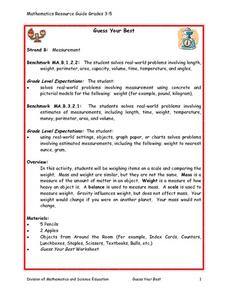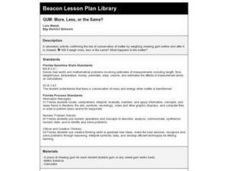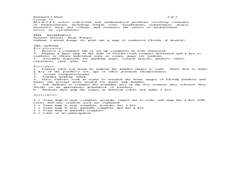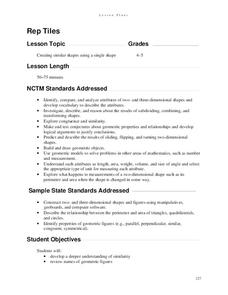Curated OER
The Chicken Run
Fourth graders work in a group of 4 to make rectangle with a 12m length of string. They discuss its perimeter and how they would calculate its area. Then another group of 4 make another rectangle and estimate if the area would be greater...
Curated OER
Penny's Box
Students need to be able to calculate the volume and surface area of a cuboid as well as present a systematic list of results in order to justify the minimum case. The use of three factors of 100 is also important.
Curated OER
You Can Count on Squares!
Fourth graders engage in and explore to develop mathematical, specifically algebraic, ideas. Although the tasks are built around measurement, they are algebraic to the extent that they require 'formulae' to be derived form the geometric...
Curated OER
Traveling to Japan: Which Way Do We Go?
Fourth graders explore the different types of ways to measure the distance between Florida and Japan.
Curated OER
String of Fish
Fourth graders research a Florida fish to determine its length. They display this information on two index cards, which are cut to the shape of the head and the tail and attached to a string that they measure and cut to the correct...
Curated OER
Construct Figures to Find Specific Volume
Sixth graders use number cubes to explore volume of two-dimensional shapes. They roll a die and construct a shape using the numbers rolled as measurements of the sides. They estimate the volume of a given object, and then use the...
Curated OER
Around We Go
Fourth graders investigate a range of circles, each with a different radius, diameter and circumference and assemble this information in their search for relationships.The measurement of circles and the relationships to be found within...
Curated OER
Guess Your Best
Students discuss situations when it is useful to know exact weight of object as opposed to estimated weight, estimate weight of various items, weigh them on scale using ounces and pounds, and compare their weights on Guess Your Best...
Curated OER
GUM: More, Less, or the Same?
Young scholars confirm the law of conservation of matter by weighing chewing gum before and after it is chewed.
Curated OER
Applying Fractions - Family Activity
In this fractions worksheet, middle schoolers solve 10 short answer problems. Students find items around their home and weigh them. Middle schoolers convert units from one unit to another in the customary system.
Curated OER
House Dimensions
Fourth graders measure the perimeters of several different rooms. They convert the measurements using ratios that allow them to draw the rooms to scale on paper. They draw the dimensions of a house to scale. They measure length to the...
Curated OER
Eye From the Sky
Students are introduced to the concept of aerial perspective and scale. Students will use satellite technology to view their neighborhoods and sketch the area surrounding their schools. They will take part in a neighborhood walk to view...
Curated OER
Home on the Range
Students use maps and mathematics to determine the appropriate panther population in a given area. In this Florida ecology lesson, students research the area requirements of male and female panther and use a map to help calculate how...
Curated OER
Making Rectangles
Students study rectangles. In this math activity, students use numbers, measurements and geometry to draw rectangles of varying sizes.
Curated OER
Angles: Angles, Angles, Everywhere
Students estimate and accurately measure the size of angles communicate with the appropriate geometric terms and symbols to describe and name angles, lines, line segments, rays
Curated OER
Angle Benchmarks
Sixth graders discuss the characteristics of specific angles and then use the information to to identify and estimate given angles. The class goes outside, identifies north, and turns a specified amount of degrees. Using a given compass,...
Curated OER
Math All Around Us
Young scholars identify real world problems from given story problems. In this story problem lesson, students find places, events or items in the school environment that can be used to create story problems. Young scholars take a picture...
Curated OER
Math: a World of Symmetry
Learners expand their knowledge of quadrilaterals and identify basic symmetrical forms. Over three weeks, they explore the math, application, and discussion of symmetry. After conducting Internet research, students create symmetrical...
Curated OER
Tiling Tessellations
Young scholars explore tessellations. In this shapes and geometry lesson, students describe the attributes of many of the shapes displayed on an Elmo. Young scholars create examples of tessellations using pattern blocks.
Mathematics Vision Project
Module 5: Modeling with Geometry
Solids come in many shapes and sizes. Using geometry, scholars create two-dimensional cross-sections of various three-dimensional objects. They develop the lesson further by finding the volume of solids. The module then shifts to finding...
Improving Measurement and Geometry in Elementary Schools
Rep Tiles
In addition to the catchy title, this lesson plan provides upper graders an opportunity to more closely scrutinize the attributes of plane figures. In particular, they focus on the similarity of different shapes. Both whole-class and...
Curated OER
Pythagorean Theorem by Graphic Manipulation
There are many different ways to show a proof of the Pythagorean Theorem. Here is a nice hands-on paper cutting activity that shows a graphic representation. You can even challenge your young Pythagoreans to come up with their own...
Shodor Education Foundation
Pythagorean Theorem
Most adults remember learning about the Pythagorean theorem, but they don't all remember how to use it. The emphasis here is on developing an intuitive understanding of how and when to use the theorem. Young mathematicians explore...
Curated OER
Around the Clock
Middle schoolers discover the relationship between the circumference of a circle and its diameter. They find the length of an arc of a circle.Students use estimation strategies in real-world applications to predict results (i.e.,...

























